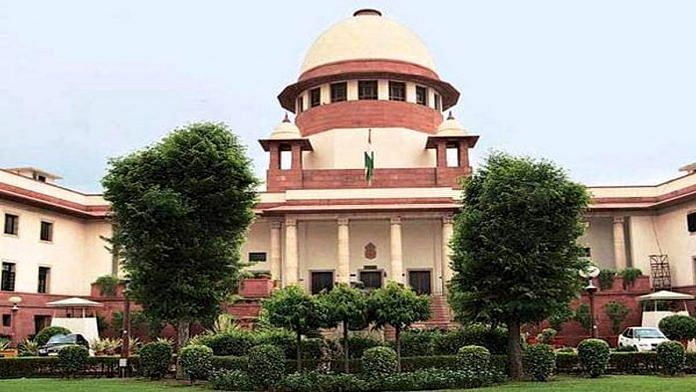New Delhi: It has taken the Supreme Court nearly 12 years to uphold the life sentence of a Chhattisgarh man who was accused of murdering his sister 21 years ago.
On 31 March, a division bench of justices Ajay Rastogi and Bela M.Trivedi dismissed the appeal of Chhattisgarh resident Mehtu Ram. The bench cancelled the bail the court had granted to him in 2010 and sent him back to serve the rest of his sentence — life imprisonment.
“In our considered view, the finding, which was recorded by the Trial Court and confirmed by the High Court in the impugned judgment and order upholding conviction of the accused-appellant (Mehtu Ram) under Section 302 (murder) of the IPC (Indian Penal Code) needs no further interference of this Court,” the bench said in the concluding paragraph of its five-page order.
“As the accused-appellant is on bail pursuant to order dated 25 August, 2010, passed by this Court, the bail bond stands cancelled and he shall surrender within four weeks from today and serve the remaining sentence awarded by the Trial Court,” it further said.
The bench also gave liberty to the authorities to initiate appropriate action against Mehtu Ram in case he failed to surrender.
Also Read: Bail ordered 19 months ago, but murder convict freed only now after another SC intervention
The case
The convict was 66 when he murdered his sister on 18 March, 2001. He had already been in jail for nearly 10 years by the time he was granted bail in August, his lawyer, senior advocate Mahalakshmi Pavani told ThePrint.
Pavani was nominated by the Supreme Court Legal Services Committee (SCLSC) because the convict couldn’t afford a lawyer to argue his case in the top court.
The trial court had originally sentenced Mehtu Ram to life imprisonment in July 2002. The high court’s February 2008 verdict confirmed the sentence.
The trial court and the high court had both relied on three child witnesses who said in their statement that they had seen Mehtu Ram dragging his sister, who was with their grandmother, a day before she died.
Pavani said the Supreme Court turned down her request to consider the convict’s age.
Pavani argued in court that Mehtu Ram was drunk when he strangled his sister, that he wasn’t in his senses and didn’t intend to kill her. Instead, she argued it was a case of “grave provocation” — in other words, culpable homicide not amounting to murder.
“I had urged the bench to convict him under section 304 (Part 2), which is a lesser offence compared to murder, and sentence him for the jail term he’d already undergone, ” she said.
Section 304 (2) of the Indian Penal Code says whoever commits culpable homicide not amounting to murder will be punished with imprisonment for life, or imprisonment of either description for a term which may extend years, and will also be liable to a fine.
This section is usually invoked in cases where it is apparent that the act is done with the knowledge that it is likely to cause death, but without the intention to cause death.
Also Read: Was there delay in transmitting SC order in Jahangirpuri case? Here’s what is supposed to happen
The delay
A perusal of the record of proceedings related to Mehtu Ram’s case shows that a bench of justices M. Kajtu and A.K. Ganguly issued notice on his appeal on 23 October, 2009. For almost a year that followed, the Chhattisgarh government didn’t mark its appearance in the case, records show.
On 25 August, 2010, another bench comprising Justice Katju and Justice T.S. Thakur granted leave in the case. It was this bench that granted Mehtu Ram bail.
Between August 2010 and January 2013, the case was taken up by the registrar’s court for completing technical formalities, such as providing translated copies of case documents to the parties involved and allowing the petitioner to file additional documents.
Finally, the appeal was then listed for a final hearing before a bench of two judges in September 2019 — six years after it was last taken up — only to get adjourned. The case never made it to the worklist for the next 2.5 years, finally only coming up for hearing on 10 March this year.
According to Pavani, Mehtu Ram’s case isn’t isolated; it’s one of many that don’t get prioritised in the Supreme Court for disposal, primarily because legal aid matters have no dedicated advocates to help follow up their listing in the court.
An official in the SC registry conceded that criminal appeals that are granted leave to be heard in the court — such as Mehtu Ram’s case — don’t get a quick hearing.
Grant of leave in a criminal appeal means the court finds the case fit for a detailed hearing followed by a judgement.
“It takes a decade for such appeals to get decided,” the officer told ThePrint on condition of anonymity.
(Edited By Uttara Ramaswamy)
Also Read: Supreme Court warns Uttarakhand over hate speech at religious event Wednesday



